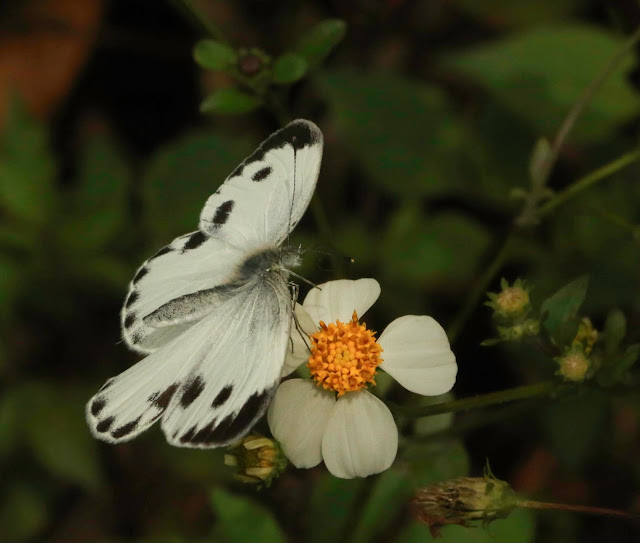Let me wrap up what I have seen and shot during a butterfly-watching (and birding) short trip to Sa Pa (Lao Cai Prov., northwest Vietnam).
At the hill station (1600m asl), the weather was gloomy, so I quickly headed to Ô Quy Hô pass (2035m) separating Lao Cai and Lai Chau Provinces, in search of sunny weather. One kilometer below the pass, along National Road 4B, I stopped at a large patch of scrubs bathed in early morning sun through misty fog. There I found 2 males Heliophorus eventa and Heliophorus brahma, side by side - two Lycaenids only recorded from the extreme north of the country. And two real lifers for me. I searched the place for another male or even the female, and bumped into a Riodinid I have also never seen before: Abisara freda - another local specialty. Three new species for my records under my belt and I was really happy. Pieris erutae montana was quite common above 1500m asl, and I had also 3-4 sightings of Colias fieldi, a nice orange Pierid only recorded in Vietnam from Ha Giang and Lao Cai Prov..
Below 500m asl, I added about 35 species to the list, mostly common stuff with broad habitat tolerance.
All in all a very enjoyable outing with records of some species very localized in Vietnam - and this despite the unfavorable season (the worst one in fact...). The hill station of Sa Pa is one of the best places in the country for Sino-Himalayan butterflies (the Hoang Lien Son range lie at the south-eastern extent of the Himalayan chain). In fact, in this area, we see the convergence of 3 distinct biogeographical realms, the Sino-Himalayan, Indo-Malayan and Palaearctic. The overlap of this 3 realms leads to a unique species composition of exceptional diversity, not only for butterflies but also for birds, amphibians, flora etc.
I will come back this year, in spring or summer, for sure!
Checklist of the species spotted at the location (Tam Đường District/Lai Chau Prov., along QL 4B, from 300m to 1800m asl, one day/6 hours):
Juniona lemonias +
Neptis hylas ++
Neptis sp. +
Cynitia lepidea +
Riodinidae
Zemeros flegyas +
Abisara echerius +
Abisara neophron +
*Abisara freda +
Lycaenidae
*Heliophorus eventa ++
*Heliophorus brahma ++
Catochrysops strabo+
Zizeeria maha +
Lampides boeticus +
Hesperidae
Notocrypta curvifascia +
Potanthus sp. ++
Parnara sp.+
Pieridae
**Pieris erutae montana ++
Pieris canidia ++
Appias lyncida +
Hebomoia glaucippe +
Eurema blanda ++
Catopsilia pomona +
**Colias fieldi ++
Nymphalidae
Danaus genutia ++
Cethoria biblis +
Parantica aglae +
Parantica sita +
Parantica melaneus+
Acraea issoria (larvae) +++
Vanessa cardui +
Euploea core ++
Lethe verma +
Mycalesis sp.
Athyma selenophora +
Athyma perius +
Moduza procris +
Symbrethia lilaea +++
**Pieris erutae montana ++
Pieris canidia ++
Appias lyncida +
Hebomoia glaucippe +
Eurema blanda ++
Catopsilia pomona +
**Colias fieldi ++
Nymphalidae
Danaus genutia ++
Cethoria biblis +
Parantica aglae +
Parantica sita +
Parantica melaneus
Acraea issoria (larvae) +++
Euploea core ++
Lethe verma +
Mycalesis sp.
Athyma selenophora +
Athyma perius +
Moduza procris +
Symbrethia lilaea +++
Juniona lemonias +
Neptis hylas ++
Neptis sp. +
Cynitia lepidea +
Riodinidae
Zemeros flegyas +
Abisara echerius +
Abisara neophron +
*Abisara freda +
Lycaenidae
*Heliophorus eventa ++
*Heliophorus brahma ++
Catochrysops strabo
Hesperidae
Notocrypta curvifascia +
Potanthus sp. ++
Parnara sp.
(Abundance : + 1-2 specimens, ++ 3-5 spec., +++ more than 5 spec.)
* Sino-Himalayan species
**Palaearctic species with distribution extending into the Oriental Region
* Sino-Himalayan species
**Palaearctic species with distribution extending into the Oriental Region
Pieris erutae montana
Found around high-altitude vegetable gardens of ethnic minority people, where the caterpillars feed on family Cruciferae like cabbages
Pieris canidia, female
Found around high-altitude vegetable gardens of ethnic minority people, where the caterpillars feed on family Cruciferae like cabbages
Pieris canidia, female
Heliophorus eventa, male
A Sino-Himalayan species known from N.Myanmar, N.Thailand, Laos, N.Vietnam, S.China
It is very localized in Vietnam (Lao Cai & Ha Giang Provinces)
Heliophorus brahma major, male - the well-named "Golden Sapphire"
Another male specimen
This nice Sino-Himalayan species occurs in N.India, N.Myanmar, N.Thailand, N.Vietnam, S.China (Yunnan at least). In Vietnam, it is recorded from Lao Cai, Ha Giang and Phu Tho Provinces (Monastyrskii & Devyatkin, 2016)
Abisara freda - a Sino-Himalayan Riodinid only recorded in Vietnam from the Hoang Lien Son range
Abisara neophron - a widespread and locally common Indo-Malayan Riodinid
Subspecies present in Vietnam is chelina
Abisara echerius - probably subsp. echerius known from northern areas along Chinese border, whereas subsp. paionea is widespread throughout the rest of the country
Vanessa cardui, undoubtedly the most widespread butterfly in the world
Male Parantica sita sita sipping nectar from Crassocephalum rubens
Particularly easy to see in this picture are the male alar androconial organ (sex brand) on the sub-tornal area of the hindwing
Athyma perius
Symbrethia lilaea
A Sino-Himalayan species known from N.Myanmar, N.Thailand, Laos, N.Vietnam, S.China
It is very localized in Vietnam (Lao Cai & Ha Giang Provinces)
Heliophorus brahma major, male - the well-named "Golden Sapphire"
Another male specimen
This nice Sino-Himalayan species occurs in N.India, N.Myanmar, N.Thailand, N.Vietnam, S.China (Yunnan at least). In Vietnam, it is recorded from Lao Cai, Ha Giang and Phu Tho Provinces (Monastyrskii & Devyatkin, 2016)
Abisara neophron - a widespread and locally common Indo-Malayan Riodinid
Subspecies present in Vietnam is chelina
Abisara echerius - probably subsp. echerius known from northern areas along Chinese border, whereas subsp. paionea is widespread throughout the rest of the country
Vanessa cardui, undoubtedly the most widespread butterfly in the world
Male Parantica sita sita sipping nectar from Crassocephalum rubens
Particularly easy to see in this picture are the male alar androconial organ (sex brand) on the sub-tornal area of the hindwing
Athyma perius
Symbrethia lilaea
Notocrypta curvifascia on Crassocephalum rubens - more colourful than the individuals I usually see around Hanoi


















No comments:
Post a Comment